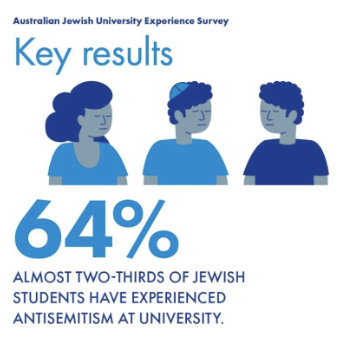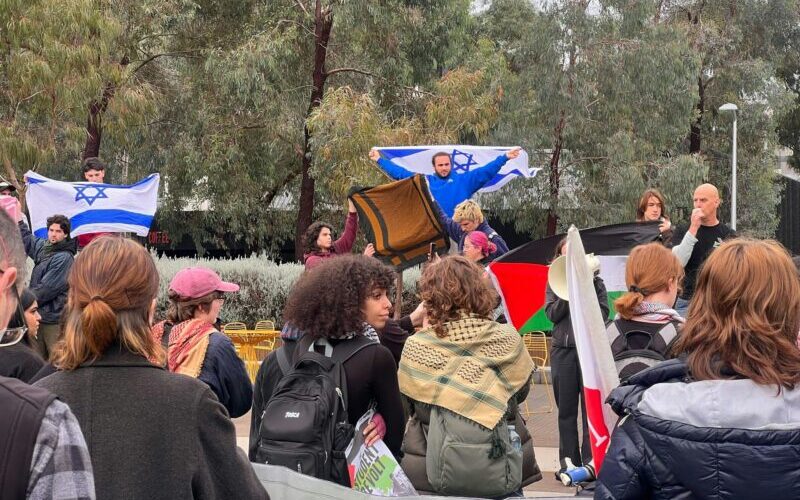Australian universities recently adopted the International Holocaust Remembrance Alliance’s definition of antisemitism. Their reasoning was based on fudging the numbers, argues historian Emma Thomas.
When does 5.8% of a specific demographic become 64% of the same demographic? When data is misrepresented in an effort to protect Israel from criticism, it seems.
On 27 February this year, Universities Australia (UA) released a “statement on racism” in which it announced that UA’s 39 members—including all 38 public universities in the country—would “adopt a clear definition of antisemitism that aligns closely with the International Holocaust Remembrance Alliance [IHRA] definition.”
Concerns about the use of the IHRA definition within higher education have long been voiced, including by the definition’s chief drafter, who, in 2019, cautioned that the definition was already being used to “weaponise” antisemitism to suppress academic freedom, including legitimate criticism of Israel on US campuses.
In Australia, despite political pressures from Labor MP Josh Burns of the Parliamentary Friends of IHRA, only five universities had previously adopted the definition. By April 2023, six universities had publicly rejected the definition.
Report conflates Australia’s ‘wave of antisemitism’ with Israel war critics
So, why the apparent change of heart? And what evidence has been produced to support such change?
A Senate bill and a survey
Amid increasingly shrill discussions about rising levels of antisemitism on Australian campuses in the wake of 7 October 2023, Liberal Senator Sarah Henderson tabled a bill calling for a commission of inquiry into the matter. According to the Bill, campus antisemitism had “reached unprecedented levels.” More concretely, the Bill presented the alarming information “that 64 per cent of Jewish university students had experienced antisemitism on campus.”
That figure cited in the Bill is drawn from a single source: a survey commissioned by the Zionist Federation of Australia (ZFA). The ZFA is an organisation whose stated purpose is “advocating for the State of Israel on behalf of the Jewish community in Australia and fostering a deep connection between Australia and Israel.”

Source: education.gov.au
The survey was conducted between 14 March and 3 April 2023, and the Social Research Centre (SRC) prepared a report titled “The Jewish University Experience Survey” that was published in July 2023.
Despite the title of the survey report, it did not offer a broad examination of Jews’ experiences within Australia’s universities. The survey’s purpose was much more specific: “to understand Jewish students’ experiences of antisemitism in Australian universities.” Questions were tightly structured around matters pertaining to antisemitism, exclusion, Holocaust denial, and “matters relating to Israel”.
Potential respondents for the survey were solicited in two ways. Firstly, the SRC sent invitations to participate in the survey to contacts on the Australasian Union of Jewish Students’ (AUJS) database. Like its affiliate organisation, the ZFA, the AUJS subscribes to “Zionist ideals” and seeks “to promote a positive image of Israel on campus”. Secondly, the SRC provided an “opt-in link” to the ZFA for promotion via “their own communication channels.”
In total, 3,330 invitations were sent out, yielding 563 completed surveys (a fairly poor response rate of just under 17%). Of the 563 respondents, 429 were current students, and 134 were former students (in the last five years). Of the 563 respondents, 360 (64%) reported experiencing antisemitism on campus. Thus, the finding that 64%, or “almost two-thirds of Jewish students have experienced antisemitism at university.”
The figure cited in Henderson’s Bill was based on the responses of 563 self-selecting individuals already in some way associated with the AUJS or ZFA.
According to the ZFA’s own estimate, the number of respondents to the survey represented approximately 7% of Australian Jewish students, approximately one-fourteenth of Jewish students enrolled or recently enrolled at an Australian university.
Framed another way and using the same metrics used by the ZFA,
approximately 94.2% of Jewish students did not report experiencing antisemitism on Australian university campuses in the commissioned survey.
A large minority (36%) of those who responded to the survey (approximately 7% of the demographic in question) also did report not experiencing campus antisemitism in the survey.
Manufactured antisemitism
Speech or events that could be considered “pro-Palestine” feature prominently in the survey report. One respondent cited the use of the phrase “from the river to the sea” as an example of campus antisemitism. Another stated: “I feel very unsafe with the presence of anti-Jewish student clubs on campus, such as Students for Palestine.” Yet another reported to “feel hesitant” about coming to campus “around Nakba Day.”
Unsurprisingly, when the ZFA distributed its findings to every Australian university in August 2023, it recommended all institutions adopt the IHRA definition of antisemitism. When the ZFA made similar recommendations to UA the following month, it did so with the claim that “a recent survey […] reveals that two-thirds of Australian Jewish university students have experienced antisemitism on campus.”
More recently, in August 2024, the ZFA repeated the (rounded up) figure of two-thirds in its submission to the Senate Inquiry into Antisemitism at Australian Universities. In this submission, the ZFA described its survey results as “academically rigorous and independently sourced”.
Perhaps it should be up to academics to decide what counts as academic rigour and what matters for academic freedom.
Cairo Takeaway stunt. Building antisemitism one caper at the time
Dr Emma Thomas is a researcher and writer based in the Greater Sydney area. As a historian, she has spent the last fifteen years studying and teaching at universities in Australia and the United States. One of the first things she teaches all her students is that opinions and evidence-based arguments are not the same thing.

